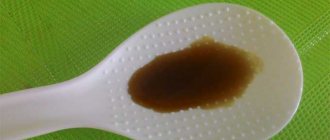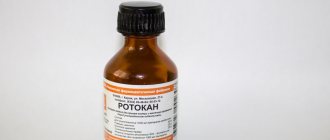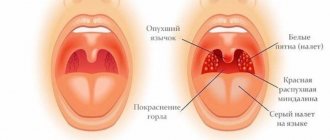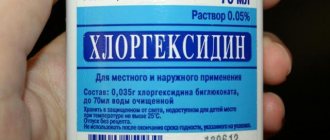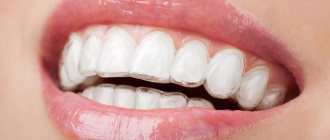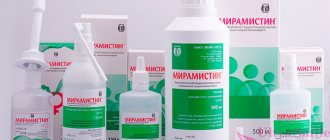With throat diseases, an adult often has an intuitive desire to rinse his throat from pathogenic microorganisms that have settled in it. To gargle at home, use saline or soda-saline solutions, decoctions of medicinal herbs with anti-inflammatory and softening effects, or special pharmaceutical products for rinsing and inhalation. Currently, in ENT practice, the drug Rotocan, made from plant components, is increasingly used for this purpose.
Compound
Rotokan plant extract is a dark red-brown or brown liquid containing the following medicinal plants in the list of components:
- chamomile;
- yarrow;
- calendula officinalis;
- licorice (rhizomes);
- eucalyptus leaves;
- Salvia officinalis;
- three-part series.
The plant extract is infused with 40% ethanol (ethyl alcohol), which should be taken into account when treating small children and pregnant women.
Composition of the drug, release form
Several varieties of medicinal plants are used in the production of the drug. Externally, the pharmaceutical product is a dark brown liquid and has a specific aroma. Plant extracts are obtained using a solution of alcohol in water.
Plant extracts included in Rotokan:
- 1 part common yarrow
- 2 parts chamomile
- 1 part medicinal calendula
The pharmaceutical product contains:
- tannins
- B vitamins
- quercetin
- chamazulene
Ethyl alcohol contained in the medicinal solution enhances the following effects of herbs:
- anti-inflammatory
- painkiller
- antiseptic
The medicine is marketed in the form of a liquid extract, which can be used orally or topically. The medicine is packaged in glass bottles that are equipped with droppers. For inpatient departments, the solution is released in brown jars of various capacities.
Indications
Of particular interest is the section of the instructions about the indications for the use of the drug Rotokan. The fact is that it does not state the possibility of using this drug in the treatment of ENT diseases. According to the instructions for use, Rotokan is intended for the treatment of diseases of the gums and oral mucosa:
- aphthous stomatitis;
- ulcerative necrotic gingivostomatitis;
- periodontitis and other inflammatory processes in the oral cavity.
Rotokan is also used in the treatment of gastroenterological pathologies - chronic enteritis, colitis and gastroduodenitis.
Many parents are confused by the fact that the instructions do not mention the purpose of the medicine Rotokan for rinsing procedures for sore throat (or tonsillitis). But it is enough to read the composition of this plant extract, its pharmacological properties and information about contraindications for use to be convinced of its effectiveness against inflammation and safety for children.
Pharmacological properties
Instructions for use indicate the following properties of the combined Rotokan extract:
- anti-inflammatory;
- antispasmodic;
- hemostatic (hemostatic).
The above-mentioned properties of this herbal remedy help relieve pain; have a healing effect on the mucous membrane of the mouth, and therefore the throat; ensure the evacuation of pathogenic bacteria and their metabolic products.
It is not known who first proposed the use of Rotokan for gargling, but practice has shown full compliance of the pharmacological actions of this medication with similar purposes. Of course, if patients have no contraindications to the use of this drug.
Read also: What is DTP and when is it done?
What to prepare for rinsing gums at home?
Chamomile
A powerful natural antiseptic used to eliminate inflammation. Among herbs for rinsing gums, chamomile occupies a leading place.
How to use:
Pour 1 tablespoon into a glass of boiling water, let it brew for 40 minutes and rinse 3 times a day after meals.
Oak bark
Oak bark is an indispensable rinse for gums. Has an astringent and hemostatic effect.
How to use:
Pour 3 tablespoons of bark into a glass of boiling water, keep in a water bath for half an hour, strain, bring the volume to 200 milliliters with boiled water and rinse 5 times a day after meals.
Sage
Rinsing with sage has a pronounced anti-inflammatory effect.
How to use:
Pour 200 milliliters of boiling water over 1 tablespoon of leaves, leave for 40 minutes, rinse 3 times a day after meals.
Baking soda
A baking soda rinse for gums reduces pain and promotes healing.
How to use:
1 teaspoon per glass of boiled water. If your gums are inflamed, rinsing with soda should be done after eating, after brushing your teeth. Use immediately, do not store!
Salt
Rinsing gums with salt has a disinfecting effect.
How to use:
1 teaspoon of salt per 1 glass of boiled water. To enhance the medicinal effect, it is best to rinse with salt and soda at the same time!
5% iodine solution
Has an antimicrobial effect.
How to use:
To rinse your gums with iodine, one drop per glass of boiled water is enough. It is better if it is lightly salted, for example, sea salt.
Propolis
The waste product of bees relieves pain well and heals wounds.
How to use:
Propolis for rinsing gums is used in the form of an alcohol tincture: 30 drops per 1 glass of boiled water, rinse 3 times a day after meals.
If you don’t have time to brew herbs, you can just as easily use pharmaceutical alcohol tinctures made from them to rinse your gums.
When is the drug contraindicated?
Before use, you should familiarize yourself with the contraindications for using Rotocan extract:
- pregnancy and breastfeeding;
- brain diseases;
- traumatic brain injuries;
- severe renal dysfunction;
- alcoholism;
- adolescence (up to 18 years of age) - this prohibition applies to oral use;
- individual intolerance to at least one of the components of the drug Rotokan.
The instructions also consider situations when the drug should be used with extreme caution - that is, under the supervision of a doctor or in consultation with him. This is due to insufficient knowledge of the likelihood of side effects when using Rotocan extract for certain diseases:
- Pyelonephritis.
- Glomerulonephritis.
- Renal dysfunction.
In other cases, Rotocan is usually well tolerated by patients.
How to use extract for rinsing?
When using Rotocan extract, you can use the recommendations for rinsing the mouth in case of dental pathologies. To prepare a rinse solution, any alcohol extracts should be diluted in a certain amount of water. The dosage for adults and children is slightly different.
- The initial dose is 1 teaspoon of extract (5 ml) per 1 glass (200 ml) of boiled (not hot) water. You should gargle for 1–2 minutes, after which it is recommended not to eat or drink anything for at least half an hour.
- If the extract is well tolerated, adults should increase the dosage to 3 teaspoons per 200 ml of water. The number of rinses per day is 2-3 times.
- The duration of treatment is usually from two to five days, depending on the onset of the therapeutic effect.
- Unlike antiseptic ENT rinses, accidental ingestion of Rotokan solution is quite acceptable. Its use is also considered safe for children. Before the procedure, the small patient should be taught this manipulation.
For children under 3 years of age, the inhalation method of administering the drug is preferable.
Methods and types of use of the product
The drug is recommended to a greater extent at the first stage of therapy. For primary symptoms of sore throat, pharyngitis and acute respiratory infections, it is useful to rinse your mouth with Rotokan:
- soreness
- itching
- pain in the throat area
- hoarseness of voice
Within 24 hours, children over 12 years of age can undergo 2 or 3 treatment sessions; for adults, the number of procedures can be increased to 5.
If an adult patient tolerates external use of the medicine well, then the dose is increased to 3 tablespoons per 200 g of water.
To rinse the gums, the method of preparing the solution is similar to that described above.
The prepared medication is used for diseases of the oral mucosa. A sterile cloth napkin is moistened in the solution and applied to the damaged area for a quarter of an hour.
For periodontal disease and after tooth extraction, Rotokan will also be useful. Small turundas moistened with a medicinal solution are inserted into the hole at the site of the former tooth or into the gum pockets. The procedure can be performed only once per day, the duration of the session should not exceed 20 minutes.
When treating diseases of the digestive tract, the medicine is taken orally. 1 teaspoon of the medicine is dissolved in 200 g of water, the resulting infusion must be drunk in two doses. The therapeutic course can last up to 3 weeks.
For inflammation of the colon, microenemas from Rotokan will help well.
For skin diseases, the drug can be used in its pure form. To do this, dip a cotton swab into the solution and apply it to pimples, abrasions or wounds.
Features of using Rotokan extract for inhalation
To carry out inhalation procedures for angina, it is recommended to use a special device - a nebulizer, which allows you to carry out inhalations at home with maximum efficiency. When using the inhaler device, you must adhere to the following rules:
- The medicine for refilling the nebulizer capsule should be diluted not with water (even boiled), but with sterile saline solution.
- The solution should be heated to a temperature of at least 20o C.
- The amount of solution should be measured using a sterile injection syringe and a special beaker included with the nebulizer.
- To dilute the drug Rotokan for inhalation, use the same dosage as for rinsing - 5 ml of extract per 200 ml of saline solution (instead of water), or 1 ml of extract.
- The duration of the procedure for small children is 3 minutes, for adults – up to 10 minutes (or until the medicine runs out).
- The frequency of procedures is up to 3 times a day.
- After use, the device should be disassembled and all removable parts should be washed under hot water and dried.
Read also: Herbs for dry and wet coughs for children and adults
All these simple rules should be followed so that inhalation actually brings a therapeutic effect, and not additional problems in the form of allergic reactions or a cough reflex.
Rotokan
Rotocan (medicinal marigold flowers (Latin: Caléndula officinális) + chamomile flowers (Latin: Matricāria chamomīlla) + yarrow herb (Latin: Achilléa millefólium) is a three-component herbal medicine that has an anti-inflammatory, antibacterial, hemostatic and reparative (accelerates tissue repair) effect. Used both externally and systemically. Has a healing effect and helps restore the integrity of the mucous membranes. Used mainly for diseases of the oral cavity of inflammatory origin:
• aphthous inflammation of the oral mucosa;
• inflammation of periodontal tissues;
• ulcerative-necrotic inflammation of the oral cavity and gums.
Another area of application of Rotokan is gastroenterology: the drug is included in protocols for the treatment of inflammation of the duodenal mucosa and pyloric zone of the stomach, chronic inflammation of the small intestine, and inflammation of the colon. It has a dosage form of solution. In the treatment of inflammatory diseases of the oral cavity, the drug is diluted in water and applied through applications to the affected areas or oral baths. Frequency of use – 2-3 times a day. The course of treatment is 2-5 days. In the treatment of periodontitis, the drug is instilled using turundas inserted into the recess between the tooth and the gum (i.e.
n. "gum pocket") The procedure is carried out every day for 5-6 days. When used in gastroenterological practice, Rotokan is used half an hour before a meal or the same period of time after it. The frequency of use is 3-4 times a day, the course of treatment is carried out for 2-3 weeks. Another way to administer the drug is into the rectum through an enema. The procedure is preceded by a cleansing enema. The course of treatment in this case is 4-6 days.
Rotocan is a dark brown liquid with a specific odor. The presence of sediment is not a sign of low-quality medicine: before use, the bottle must be shaken to obtain a homogeneous solution. Due to its herbal nature, the drug has virtually no clinically significant side effects. In rare cases, allergic reactions may develop. The only contraindication to the use of Rotokan is individual intolerance to any component (components) of the drug. There have been no cases of overdose with Rotokan, as well as acute poisoning with the drug. Medicines are sold from pharmacies without presenting a doctor's prescription. It is recommended to store Rotokan in a cool (8-15 °C) place, protecting it from direct sunlight.
